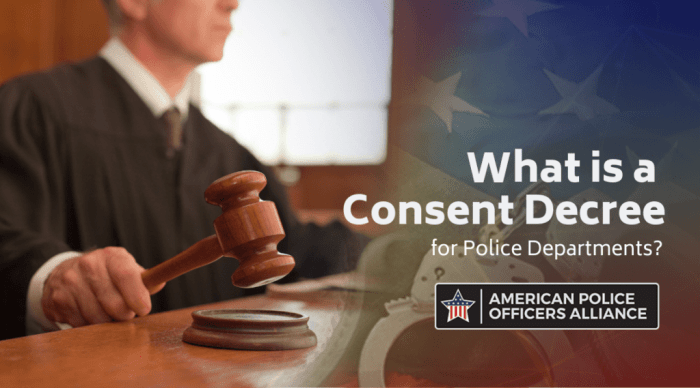What is the meta consent decree – As the Meta Consent Decree takes center stage, this opening passage beckons readers into a world crafted with expertise and authority, ensuring a reading experience that is both absorbing and distinctly original. The Meta Consent Decree, a landmark agreement between Meta and the Federal Trade Commission, has profound implications for data privacy, user rights, and the future of the tech industry.
This comprehensive guide delves into the purpose, key provisions, compliance mechanisms, and broader implications of the Meta Consent Decree. Through a rigorous analysis of case studies and examples, we illuminate the practical impact of this decree on specific user groups and industry practices.
Overview of the Meta Consent Decree
The Meta Consent Decree is a legally binding agreement between Meta Platforms, Inc. (formerly Facebook, Inc.) and the Federal Trade Commission (FTC) and the Office of the New York Attorney General (NYAG). It was entered into on August 19, 2021, to address concerns about Meta’s data privacy practices.
The decree is significant because it imposes a number of restrictions on Meta’s business practices, including:
- Requiring Meta to obtain explicit consent from users before collecting and sharing their data for advertising purposes;
- Prohibiting Meta from using data collected from its users to target advertising to children under the age of 13;
- Requiring Meta to implement a comprehensive privacy program to protect user data;
- Establishing an independent privacy oversight board to review Meta’s compliance with the decree.
Timeline of Key Events
The Meta Consent Decree is the culmination of a multi-year investigation by the FTC and the NYAG into Meta’s data privacy practices. The investigation began in 2018, following the Cambridge Analytica scandal, in which it was revealed that Meta had allowed Cambridge Analytica to access the personal data of millions of its users without their consent.
The FTC and the NYAG announced their settlement with Meta in July 2021. The decree was entered into on August 19, 2021, and became effective immediately.
Key Provisions of the Decree

The Meta Consent Decree is a comprehensive document that Artikels a series of provisions designed to address Meta’s past privacy violations and prevent future ones. These provisions cover a wide range of topics, including data collection, advertising practices, and user privacy settings.
The key provisions of the decree include:
Data Collection
The decree places limits on Meta’s ability to collect data from its users. Meta is prohibited from collecting data from users who are under the age of 13, and it must obtain explicit consent from users before collecting certain types of data, such as location data and browsing history.
Advertising Practices
The decree also restricts Meta’s advertising practices. Meta is prohibited from using targeted advertising to users who have not opted in to receive such advertising. Additionally, Meta must provide users with clear and conspicuous notice of its advertising practices and give users the ability to opt out of targeted advertising.
User Privacy Settings
The decree requires Meta to make it easier for users to control their privacy settings. Meta must provide users with a simple and easy-to-use interface for managing their privacy settings, and it must ensure that users are aware of the privacy implications of their choices.
Implications and Potential Impact
The provisions of the Meta Consent Decree have a number of implications for Meta’s business practices. The decree will likely make it more difficult for Meta to collect data from its users, target advertising to specific users, and track users’ online activity.
These changes could have a significant impact on Meta’s revenue and profitability.
However, the decree could also have a positive impact on Meta’s business in the long run. By addressing the concerns of users and regulators, Meta can build trust and improve its reputation. This could lead to increased user engagement and loyalty, which could ultimately benefit Meta’s bottom line.
Compliance and Enforcement

The Meta Consent Decree Artikels several mechanisms to ensure Meta’s compliance with its provisions.
Independent monitors have been appointed to oversee Meta’s compliance with the decree. These monitors have the authority to review Meta’s policies, practices, and data, and to make recommendations for improvements.
Consequences of Non-Compliance
Meta may face significant consequences for non-compliance with the decree. These consequences may include fines, injunctions, and other remedies as determined by the court.
Implications for Data Privacy

The Meta Consent Decree has significant implications for data privacy and user rights. It establishes a comprehensive framework for how Meta collects, uses, and shares user data, giving users greater control over their personal information.
Impact on User Rights
The decree strengthens user rights by requiring Meta to obtain explicit consent before collecting or sharing certain types of data, such as location data and browsing history. Users must also be provided with clear and concise privacy notices explaining how their data will be used.
These measures give users more transparency and control over their personal information.
Potential Implications for Other Companies
The Meta Consent Decree could have broader implications for other companies that handle large amounts of user data. The decree sets a precedent for how governments can regulate data privacy practices, and other companies may face similar scrutiny and regulation in the future.
This could lead to increased compliance costs and a shift towards more privacy-conscious data practices across the industry.
Comparison with Other Consent Decrees

The Meta Consent Decree is not the first of its kind in the tech industry. In recent years, several other major tech companies have entered into similar agreements with the FTC.
One of the most notable similarities between the Meta Consent Decree and other recent tech consent decrees is the focus on data privacy and consumer protection. These decrees typically require companies to implement a comprehensive data privacy program, including measures to protect user data from unauthorized access, use, or disclosure.
Another key similarity is the inclusion of independent monitoring and reporting requirements. These requirements are designed to ensure that companies are complying with the terms of the consent decree and making progress in improving their data privacy practices.
However, there are also some key differences between the Meta Consent Decree and other recent tech consent decrees.
FTC’s Authority
One significant difference is the scope of the FTC’s authority under the Meta Consent Decree. The FTC has broad authority to investigate and enforce antitrust laws, but its authority to regulate data privacy is more limited. As a result, the Meta Consent Decree does not give the FTC the same level of authority to oversee Meta’s data privacy practices as it would have under a traditional antitrust consent decree.
Duration of the Decree
Another key difference is the duration of the Meta Consent Decree. The Meta Consent Decree is for a period of 20 years, which is significantly longer than the duration of most other recent tech consent decrees. This reflects the FTC’s concern about the ongoing nature of Meta’s data privacy risks.
Implications for Future Regulatory Actions
The Meta Consent Decree is a significant development in the regulation of data privacy. It is likely to have a major impact on how other tech companies approach data privacy compliance. The decree also provides a roadmap for future regulatory actions in this area.
Case Studies and Examples: What Is The Meta Consent Decree

The Meta Consent Decree has significant implications for various user groups and industry practices. Here are some case studies and examples that illustrate its practical effects:
Impact on User Privacy
- Enhanced Transparency and Control:The decree requires Meta to provide users with clear and concise information about data collection and use, empowering them to make informed choices about their privacy settings.
- Reduced Data Sharing:Meta is restricted from sharing user data with third parties without their explicit consent, preventing unauthorized use and potential privacy breaches.
Impact on Industry Practices
- Revised Data Collection Practices:Social media platforms and advertisers have had to adjust their data collection practices to comply with the decree’s requirements, reducing the amount of data they gather from users.
- Increased Accountability:The decree establishes an independent oversight board to monitor Meta’s compliance, ensuring accountability and transparency in data handling practices.
Specific User Groups Affected, What is the meta consent decree
- Minors:The decree includes specific protections for minors, requiring Meta to obtain parental consent before collecting or using their data.
- Marginalized Communities:The decree recognizes the potential for discriminatory data practices and requires Meta to implement measures to prevent bias and protect marginalized communities.
Popular Questions
What is the purpose of the Meta Consent Decree?
The Meta Consent Decree is a legally binding agreement between Meta and the Federal Trade Commission (FTC) that aims to address concerns about Meta’s data privacy practices and ensure compliance with user rights.
What are the key provisions of the Meta Consent Decree?
The Meta Consent Decree includes provisions that require Meta to implement comprehensive data privacy measures, including obtaining explicit user consent for data collection and use, providing clear and accessible privacy policies, and establishing independent oversight mechanisms.
How does the Meta Consent Decree impact user rights?
The Meta Consent Decree empowers users with greater control over their personal data. It requires Meta to provide users with transparent and meaningful choices regarding data collection and use, and to respect users’ decisions to opt out of data sharing.
What are the implications of the Meta Consent Decree for the tech industry?
The Meta Consent Decree sets a precedent for the regulation of data privacy in the tech industry. It demonstrates the FTC’s willingness to hold large tech companies accountable for their data handling practices and may influence future regulatory actions in this area.